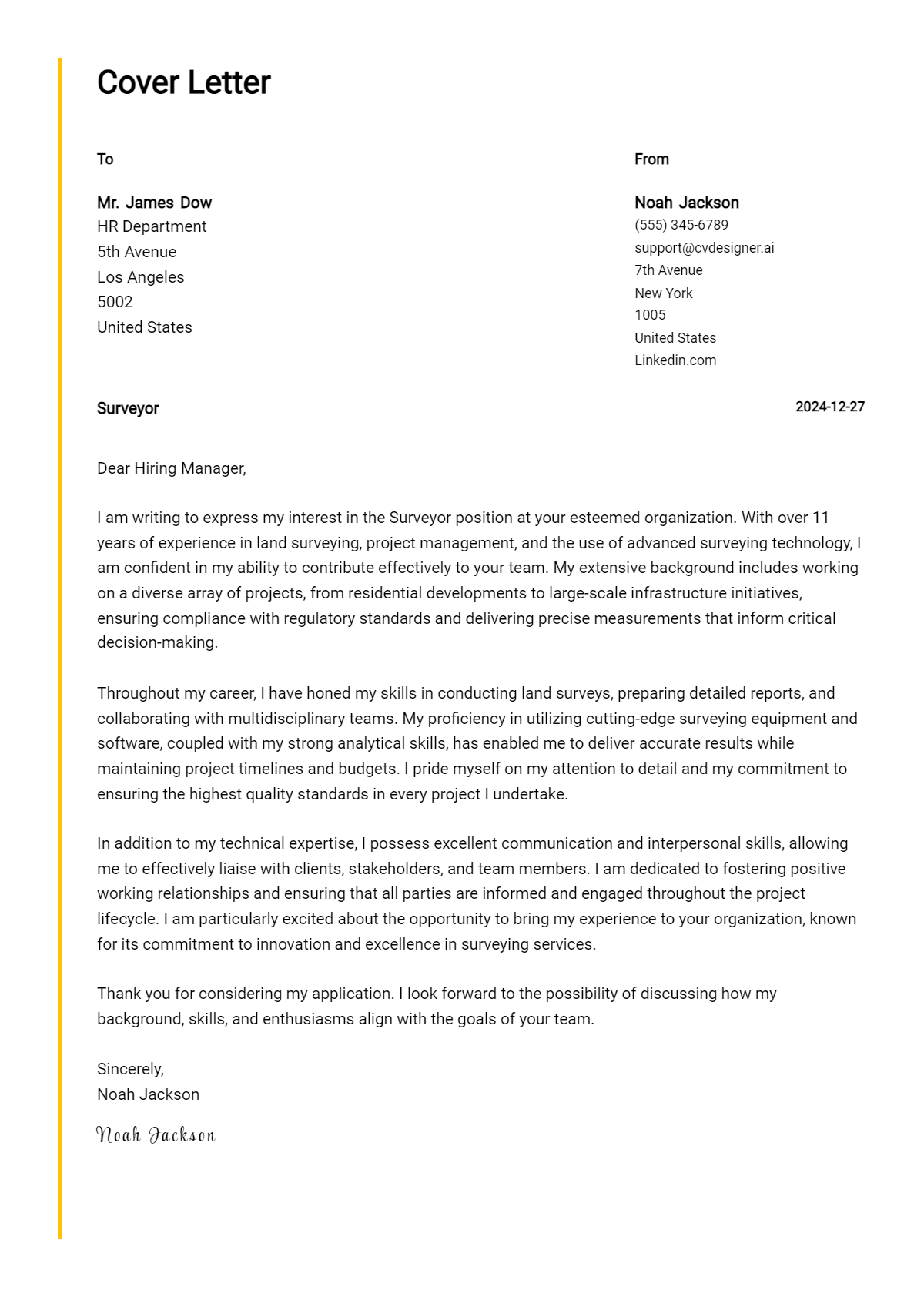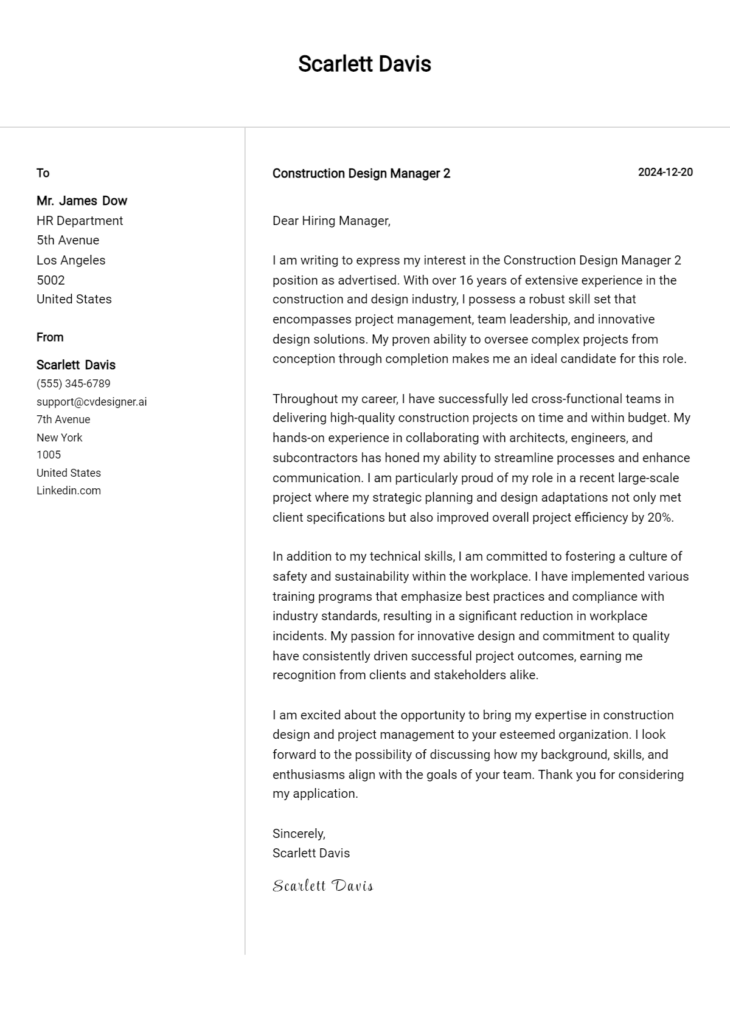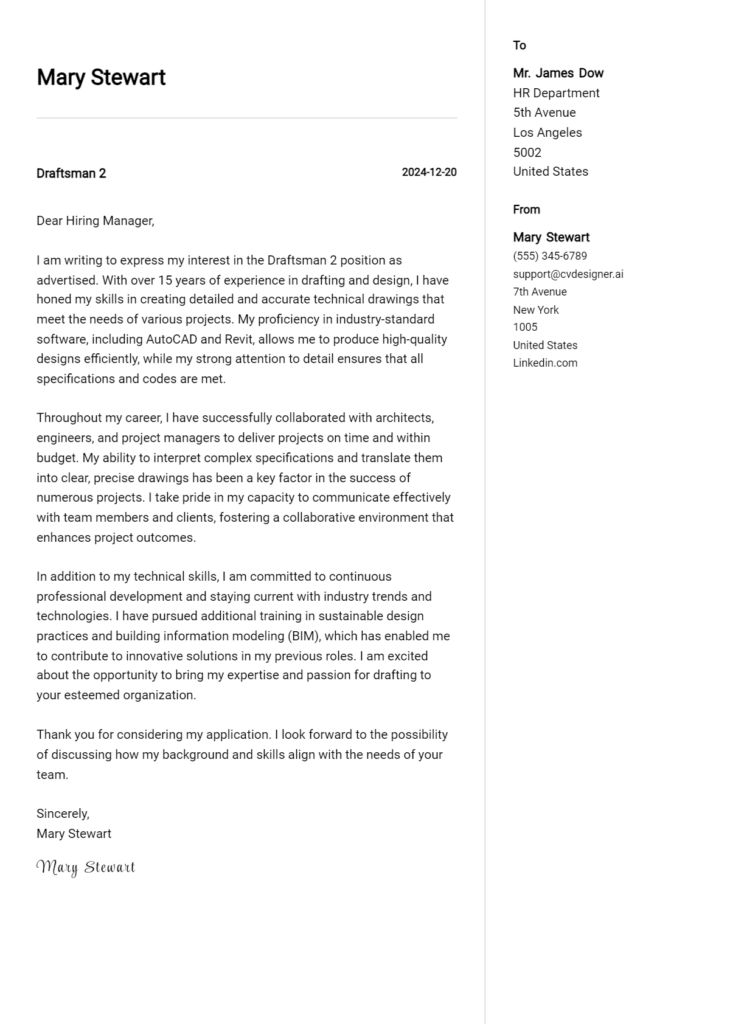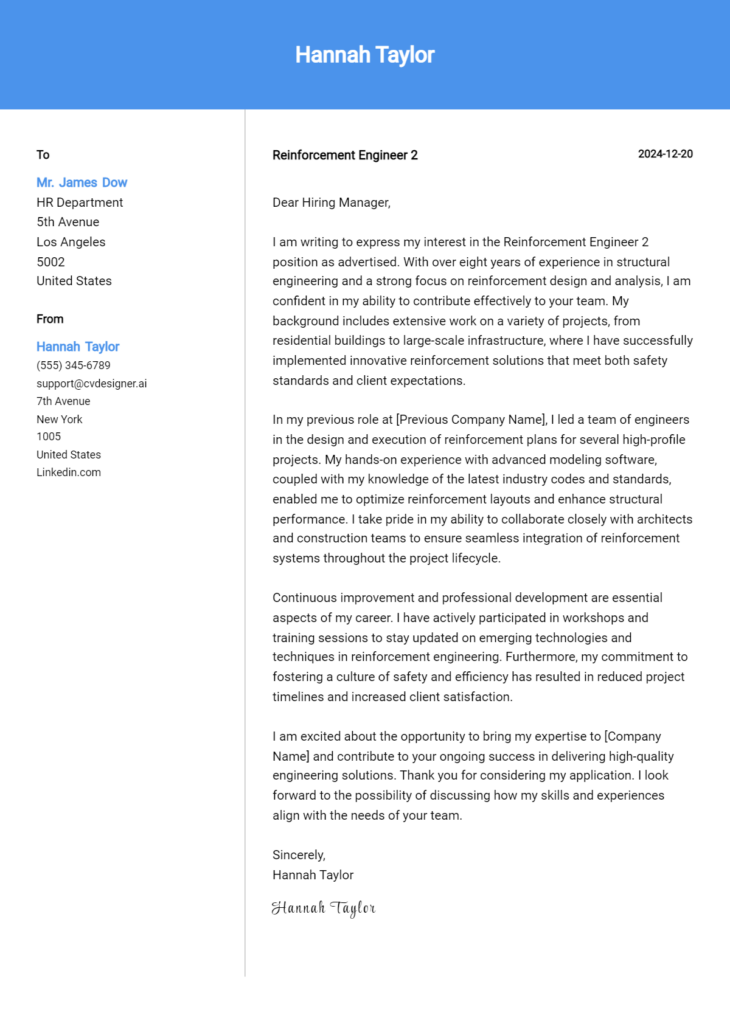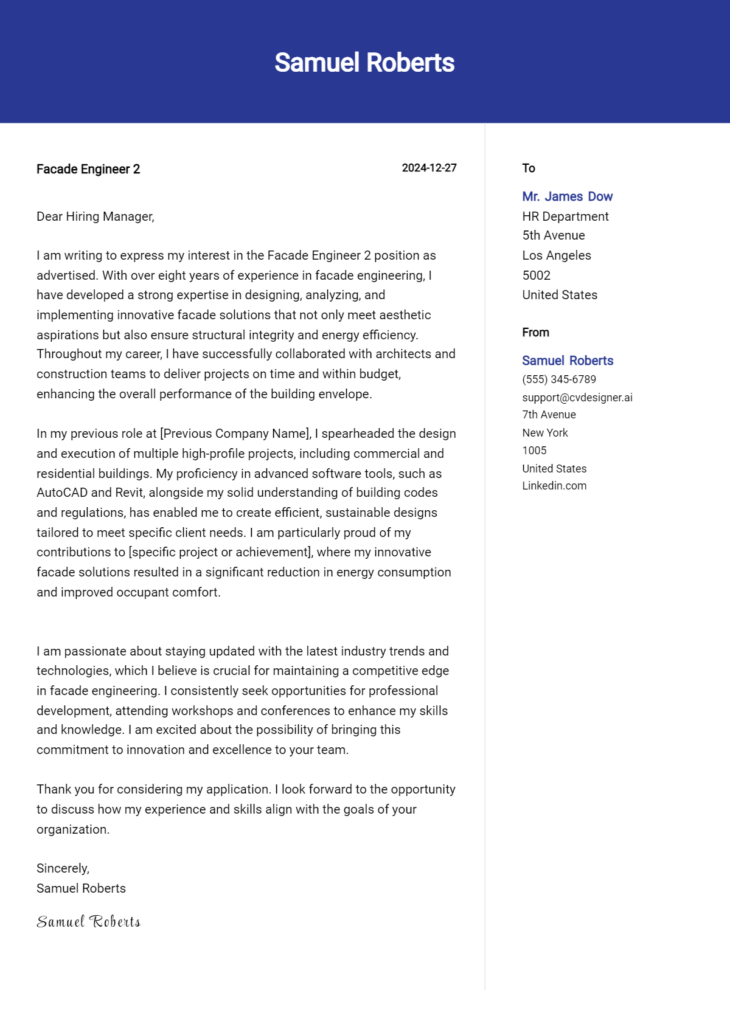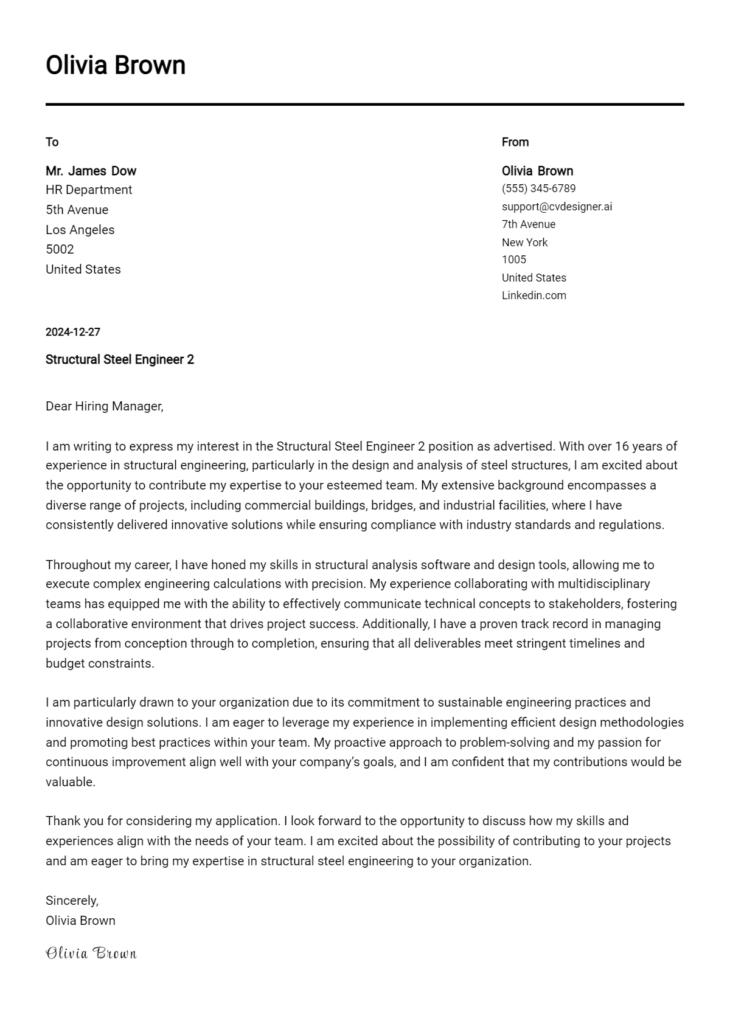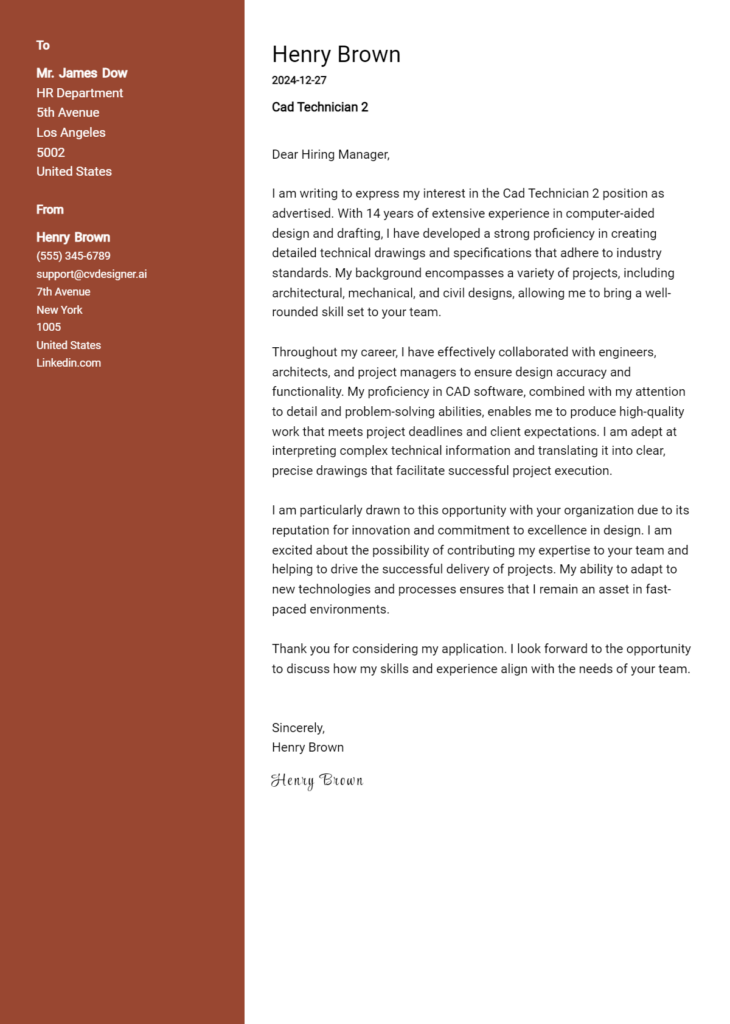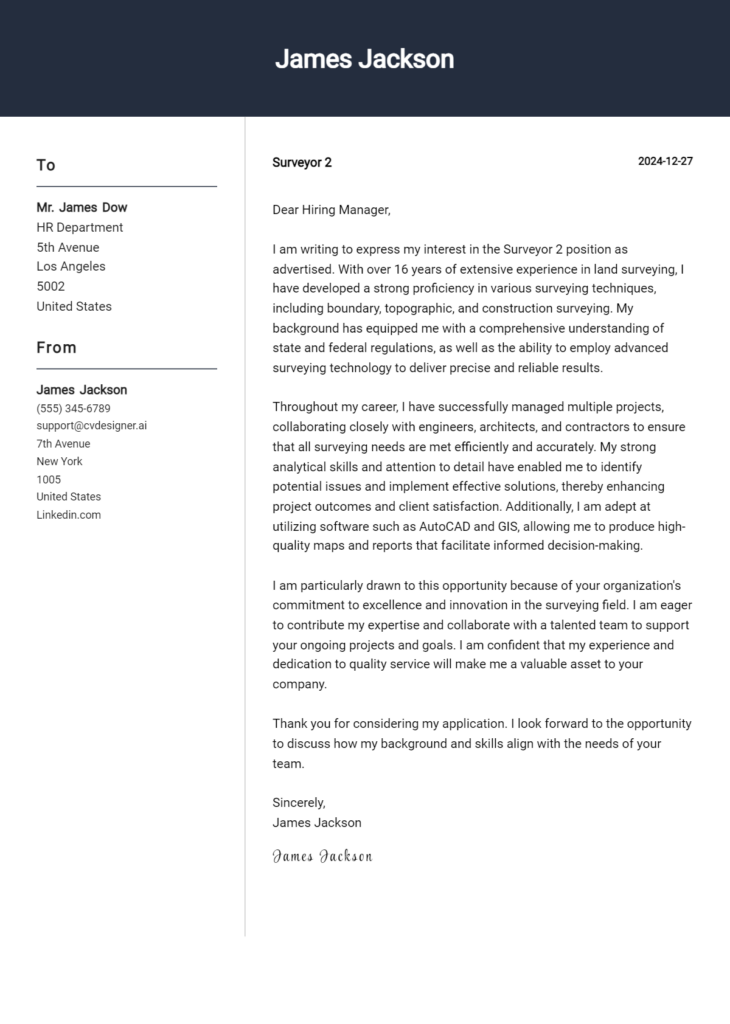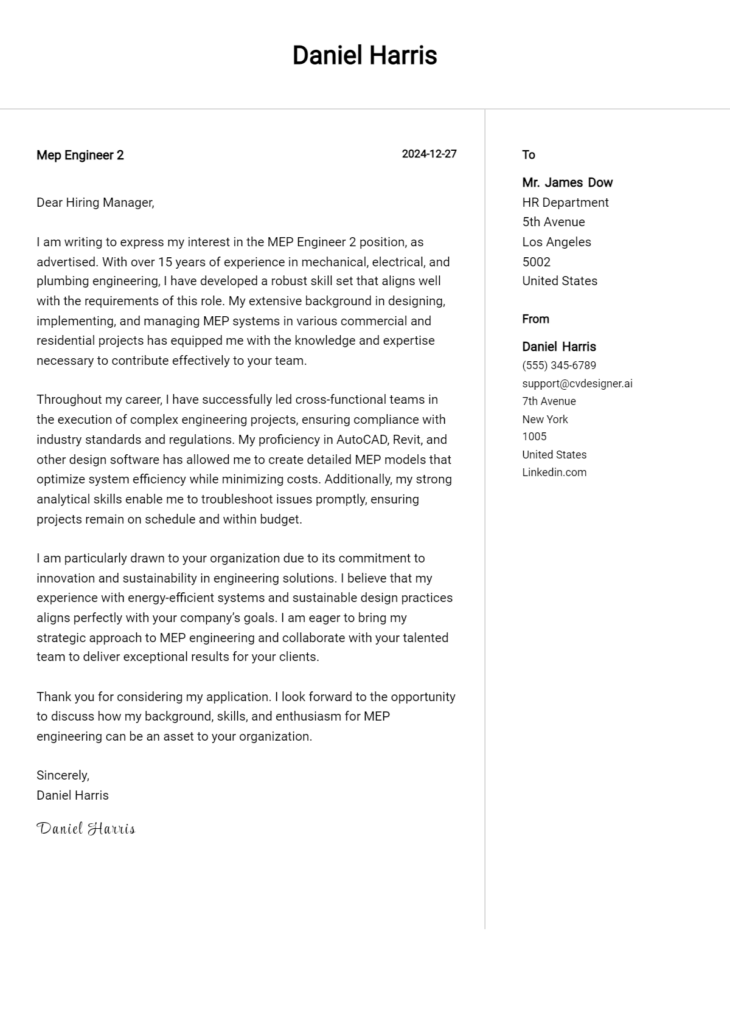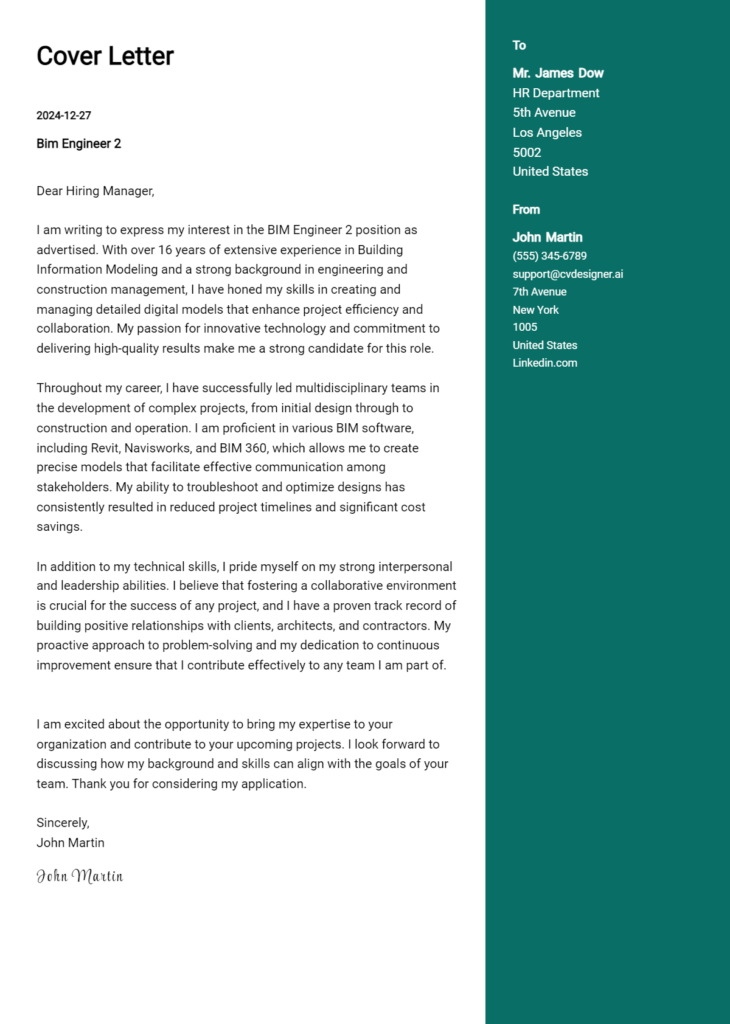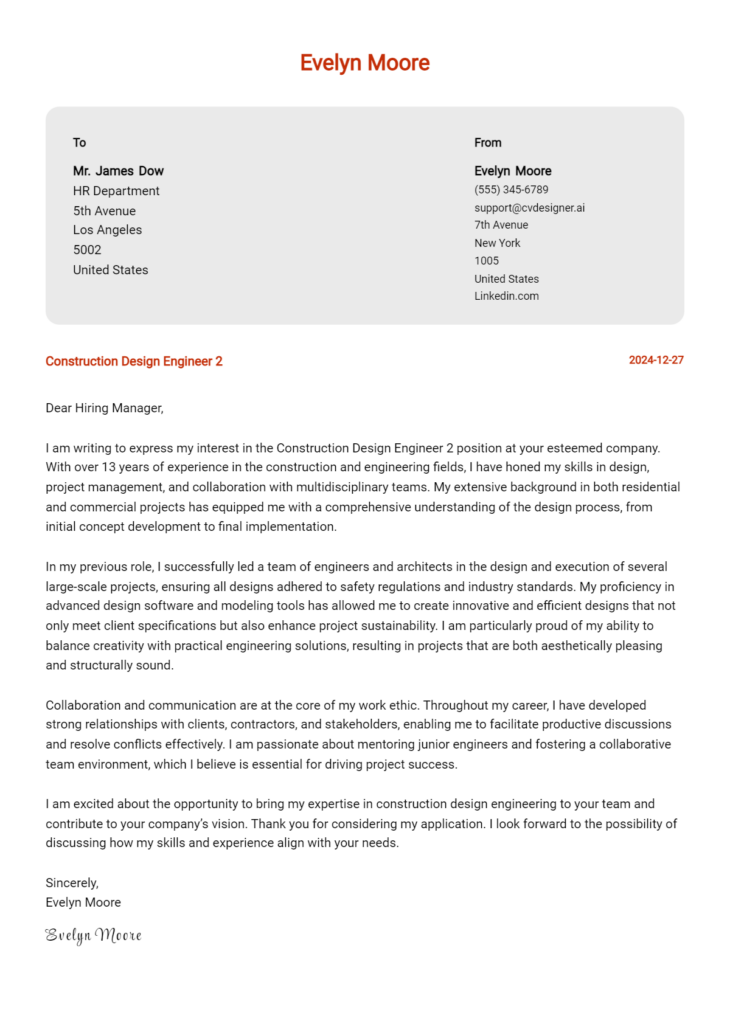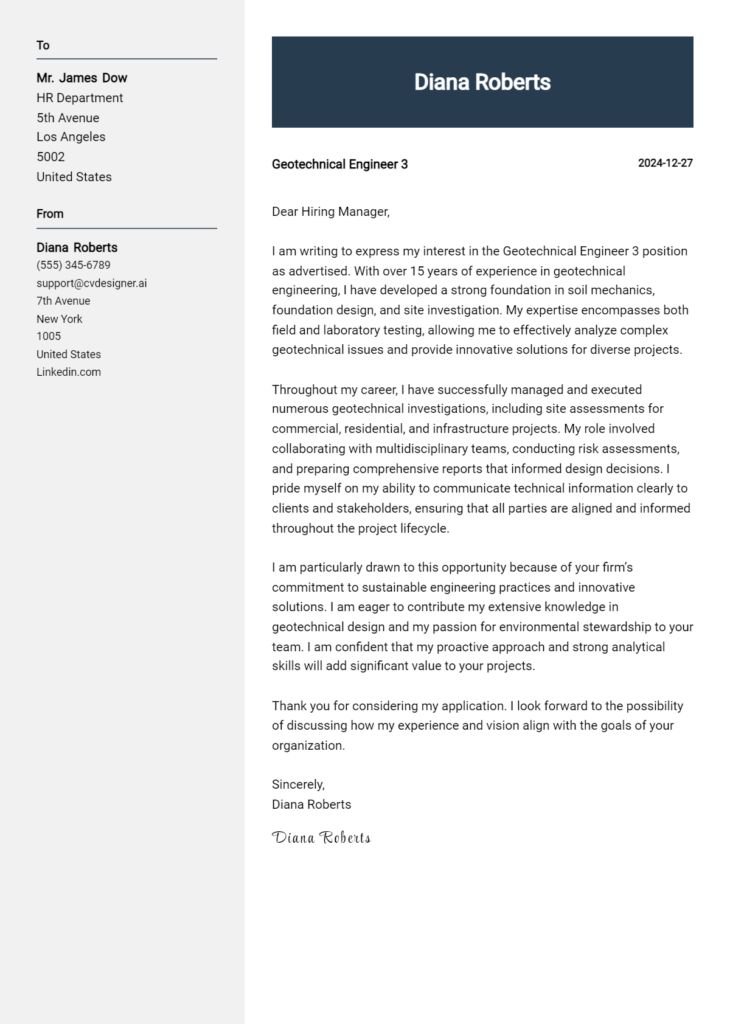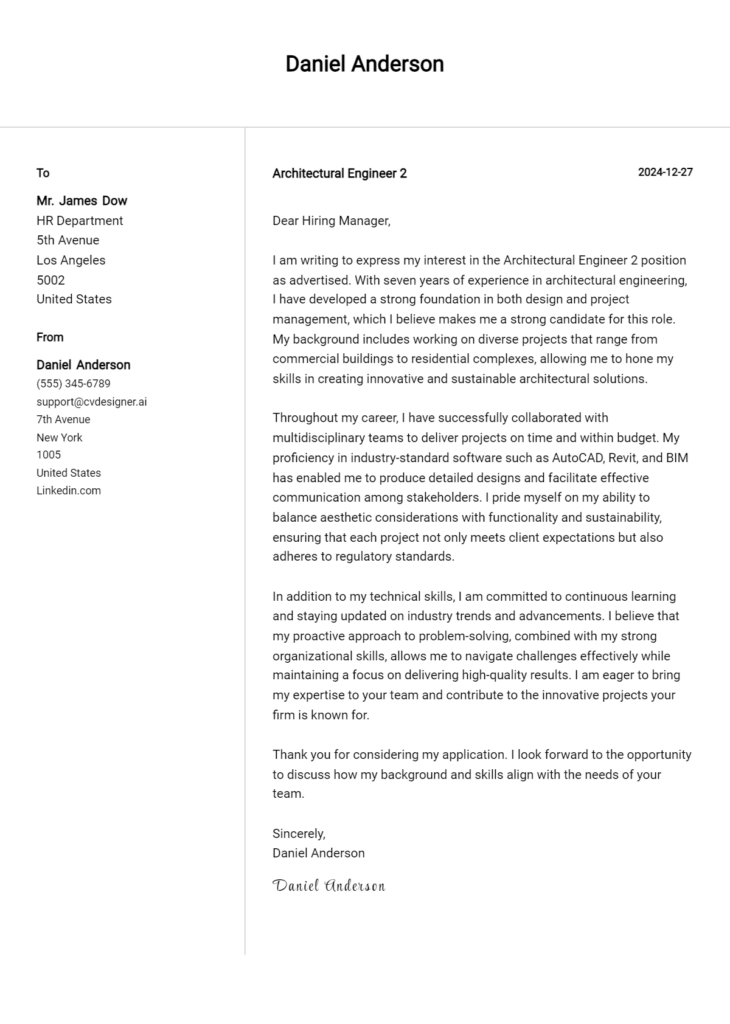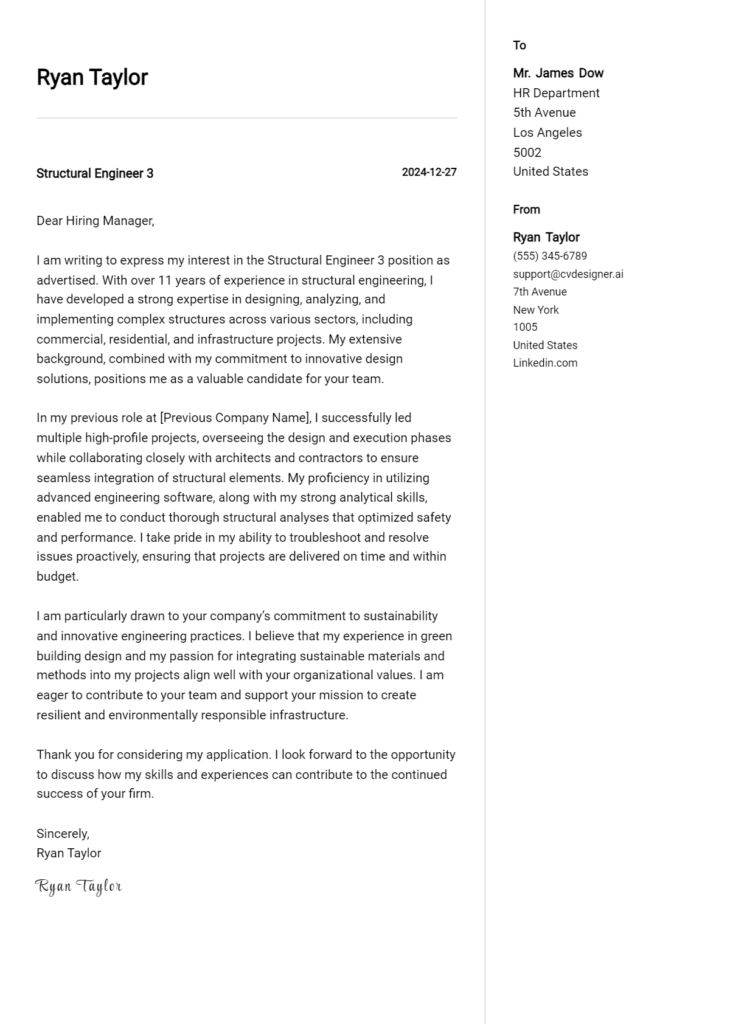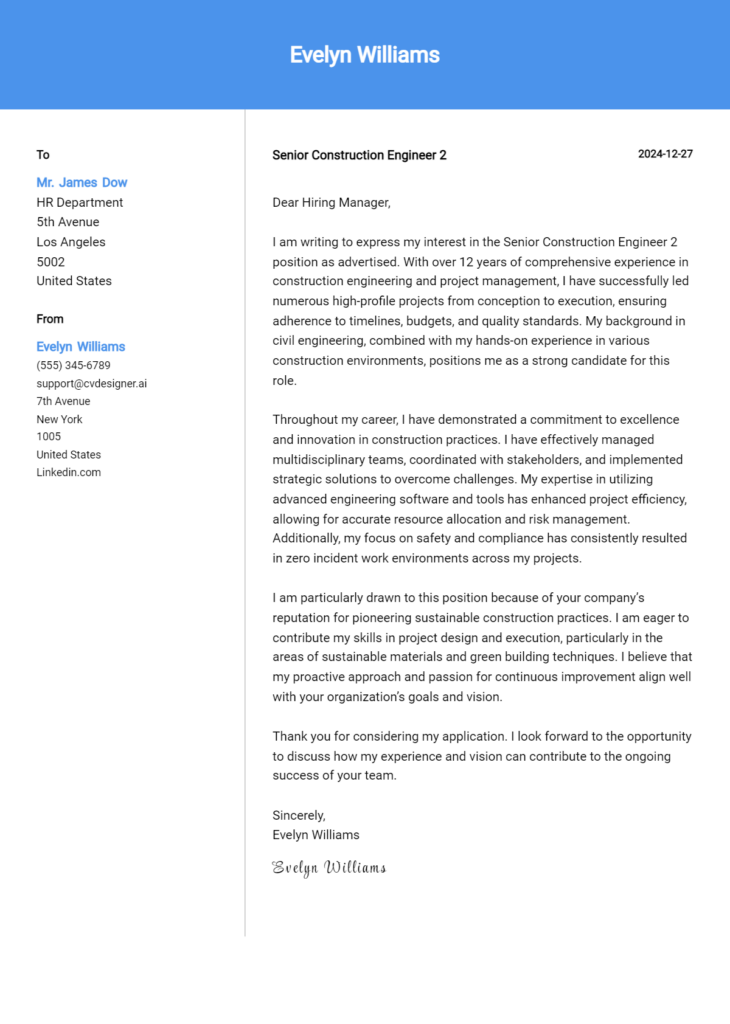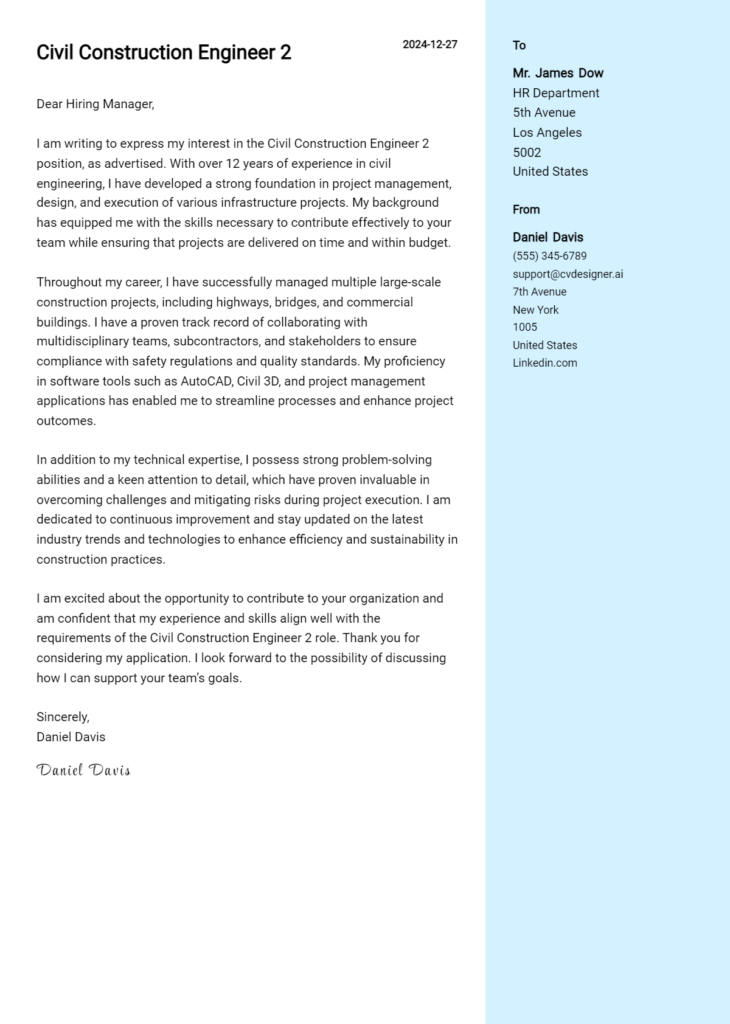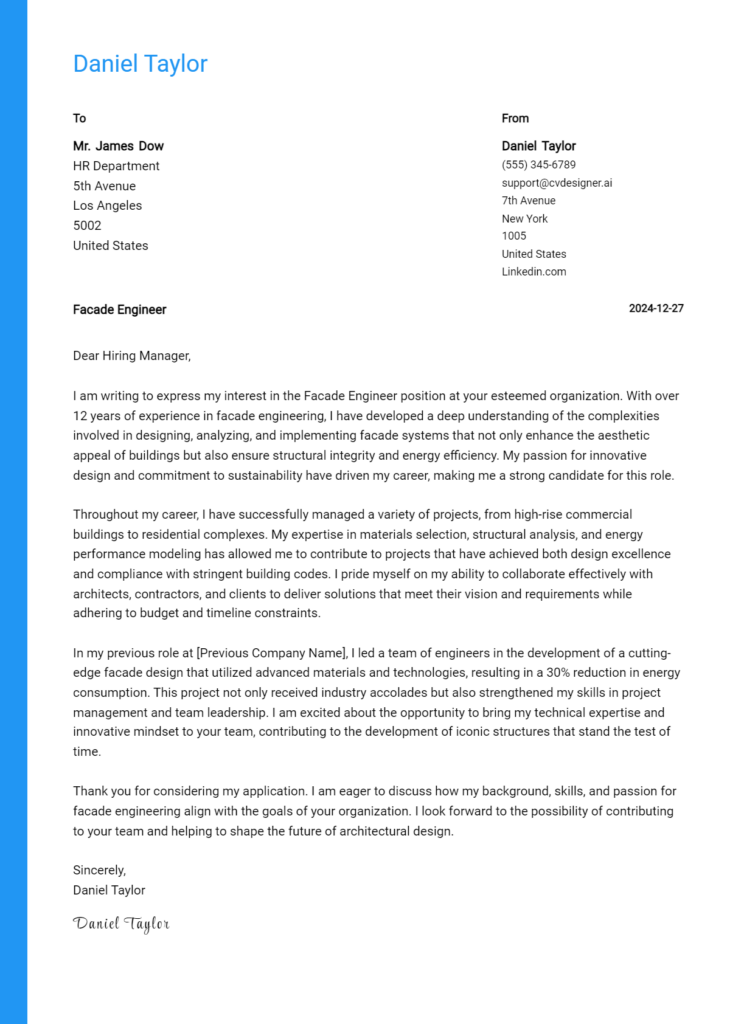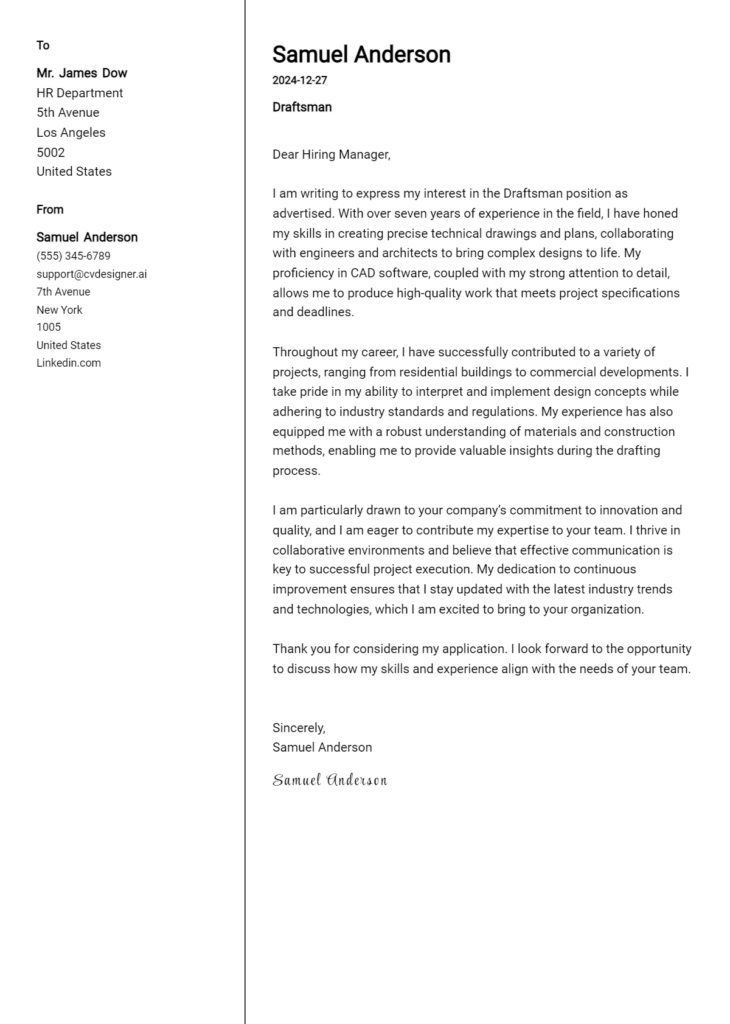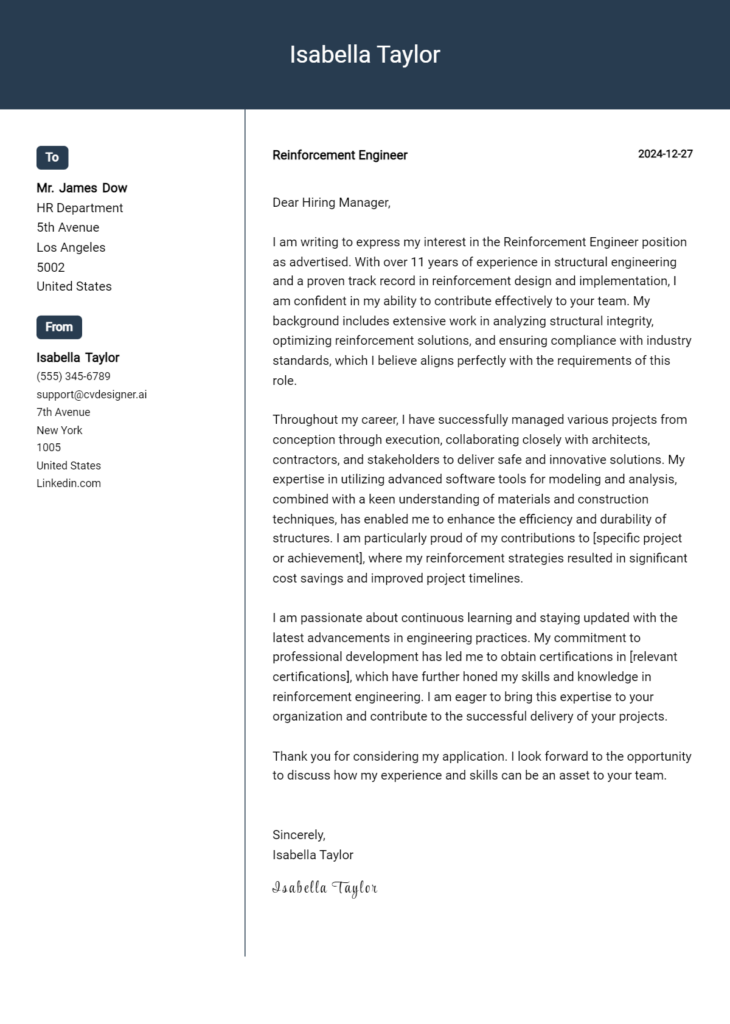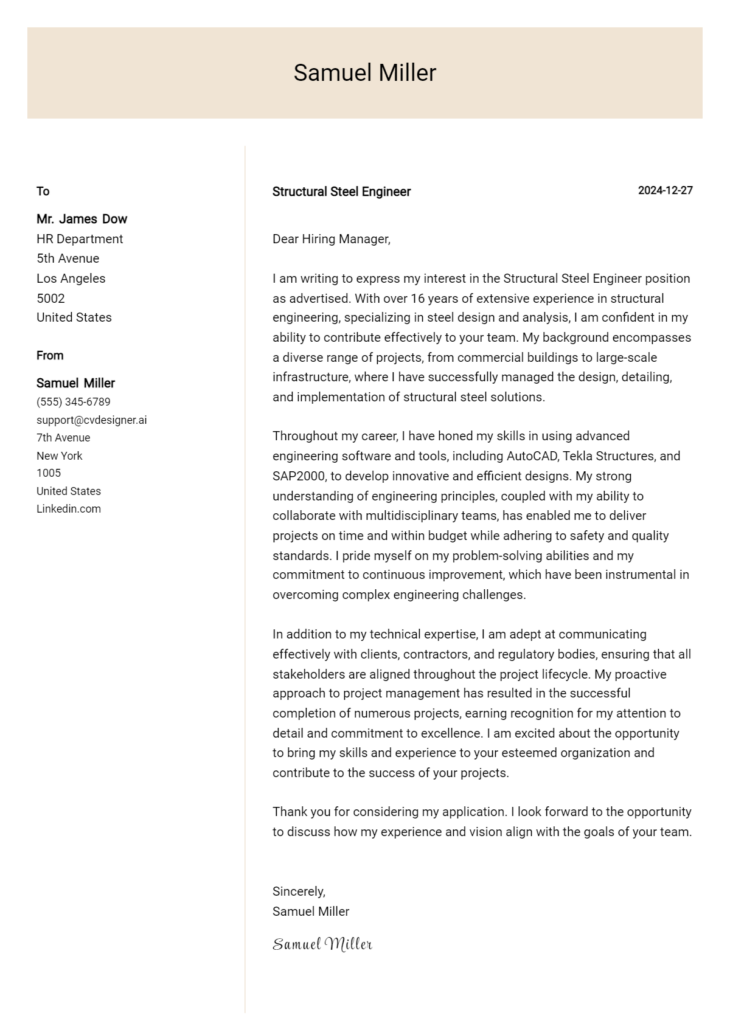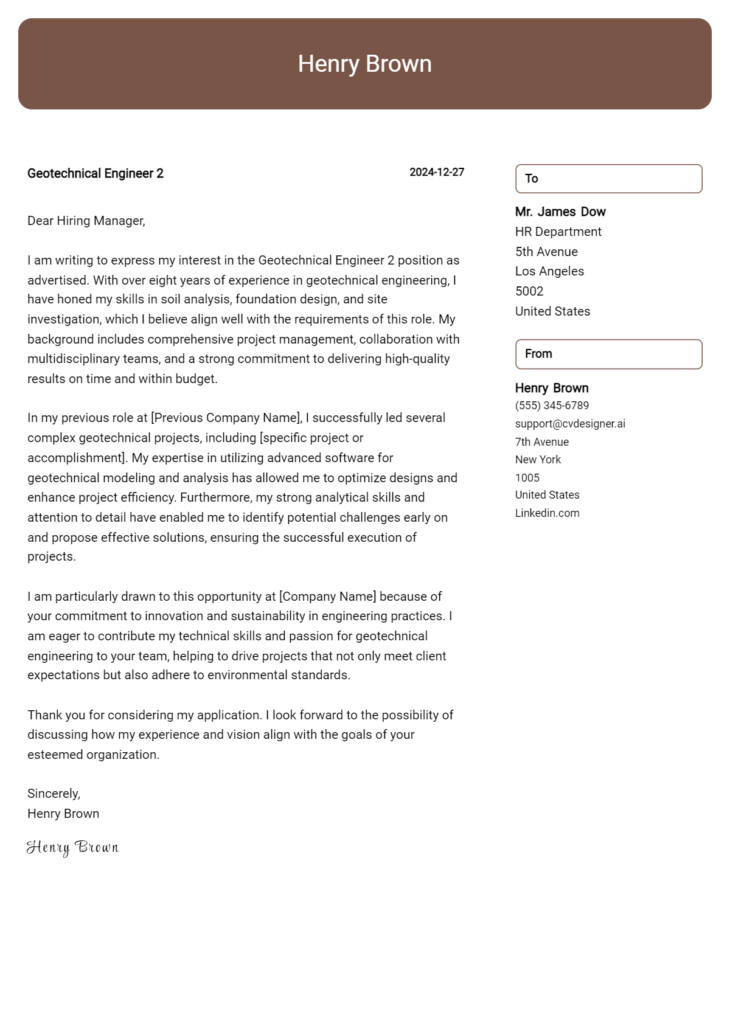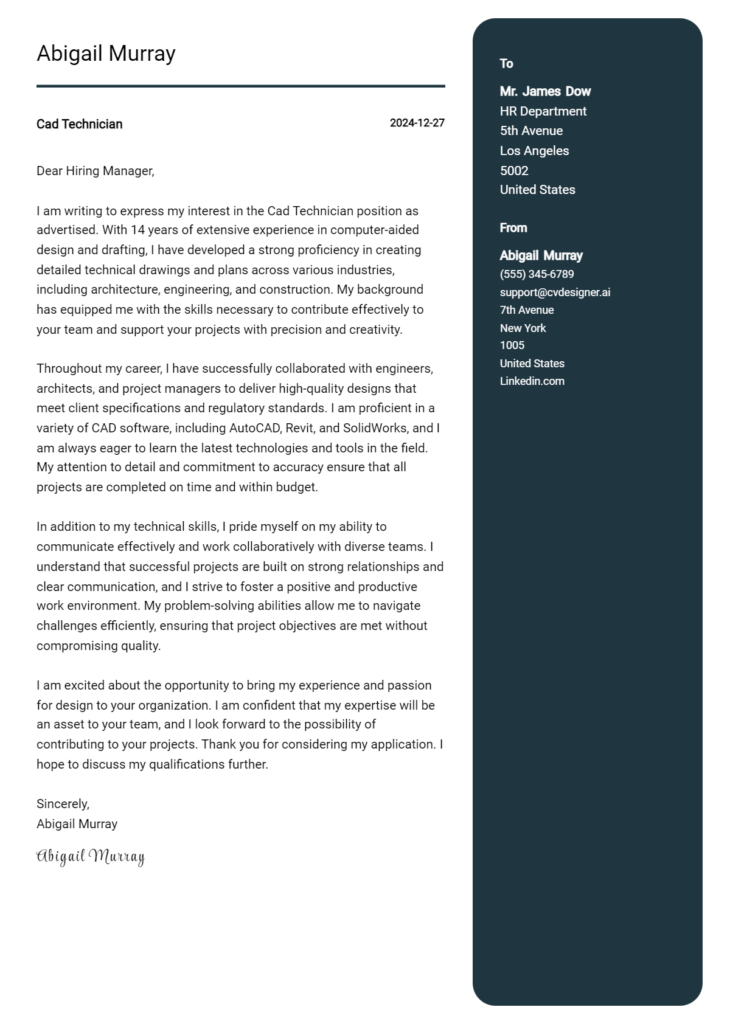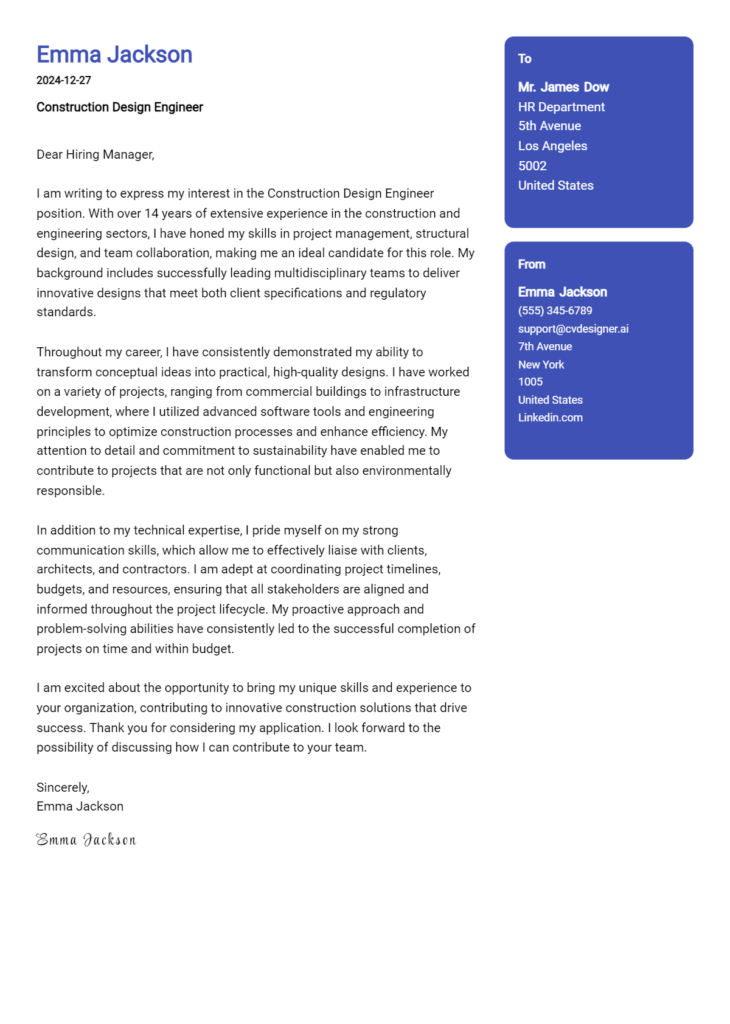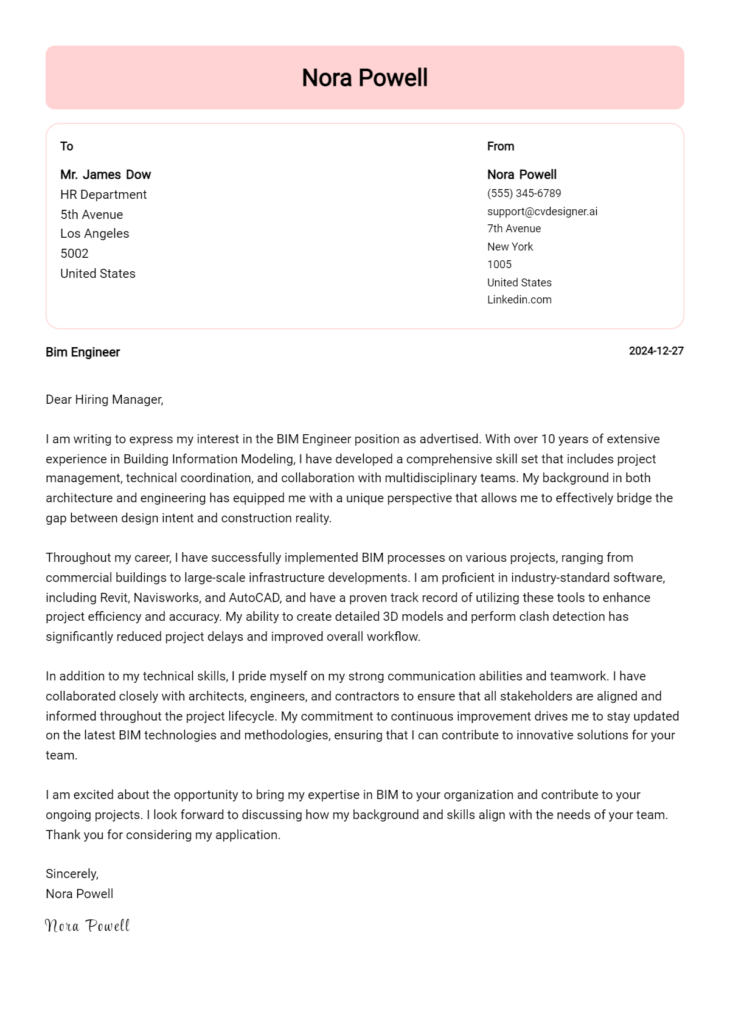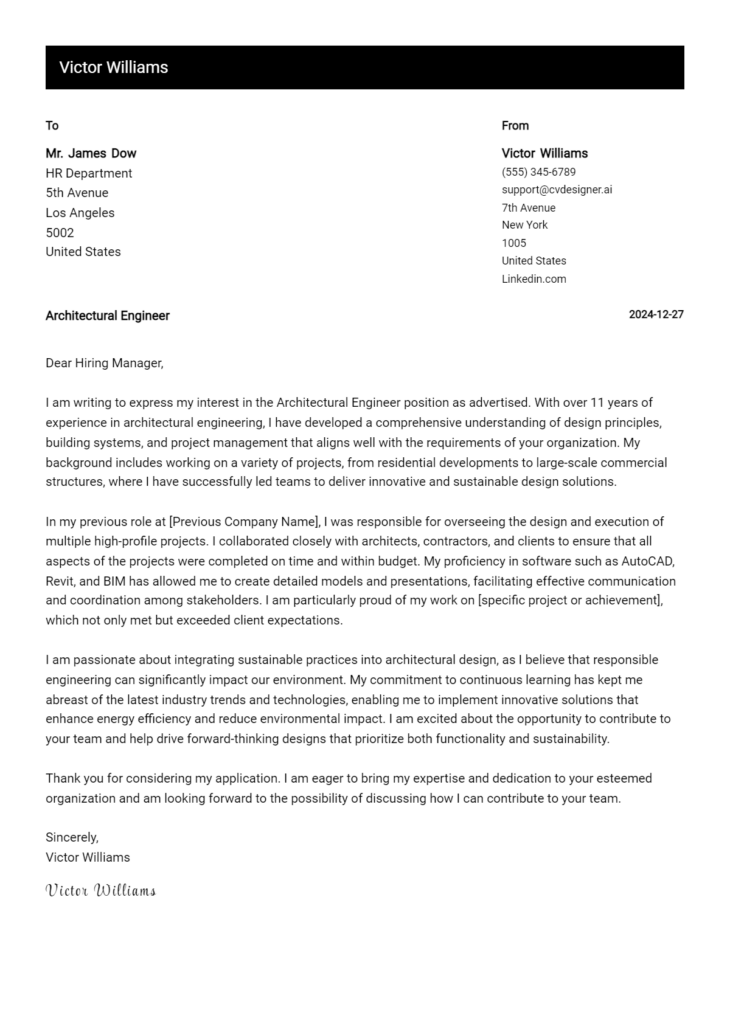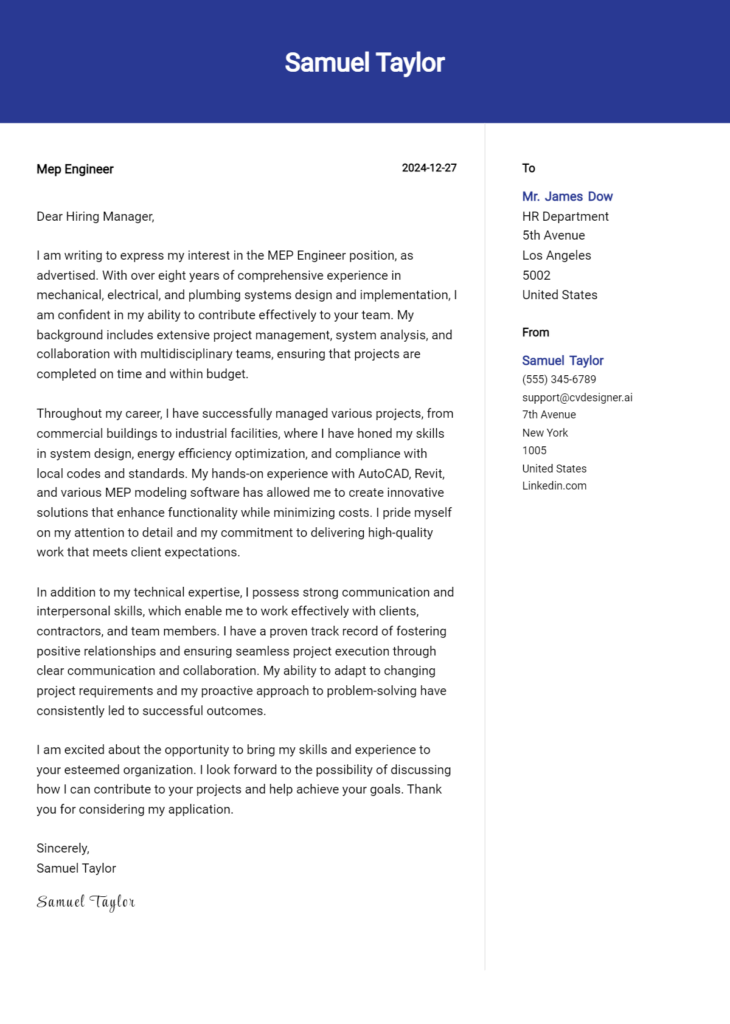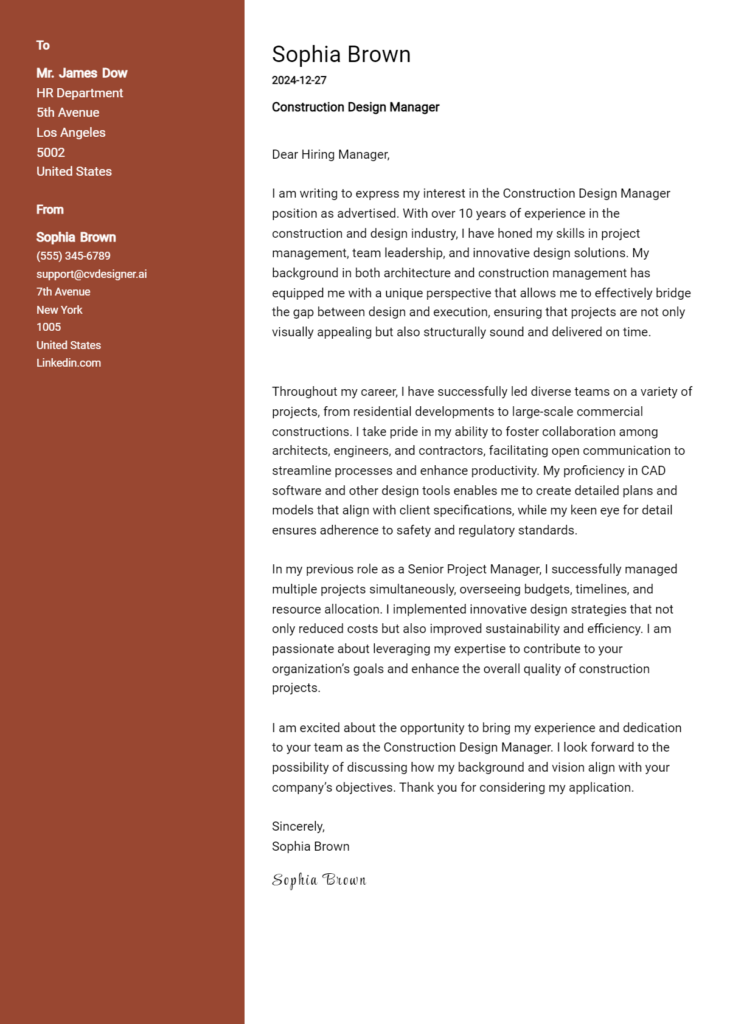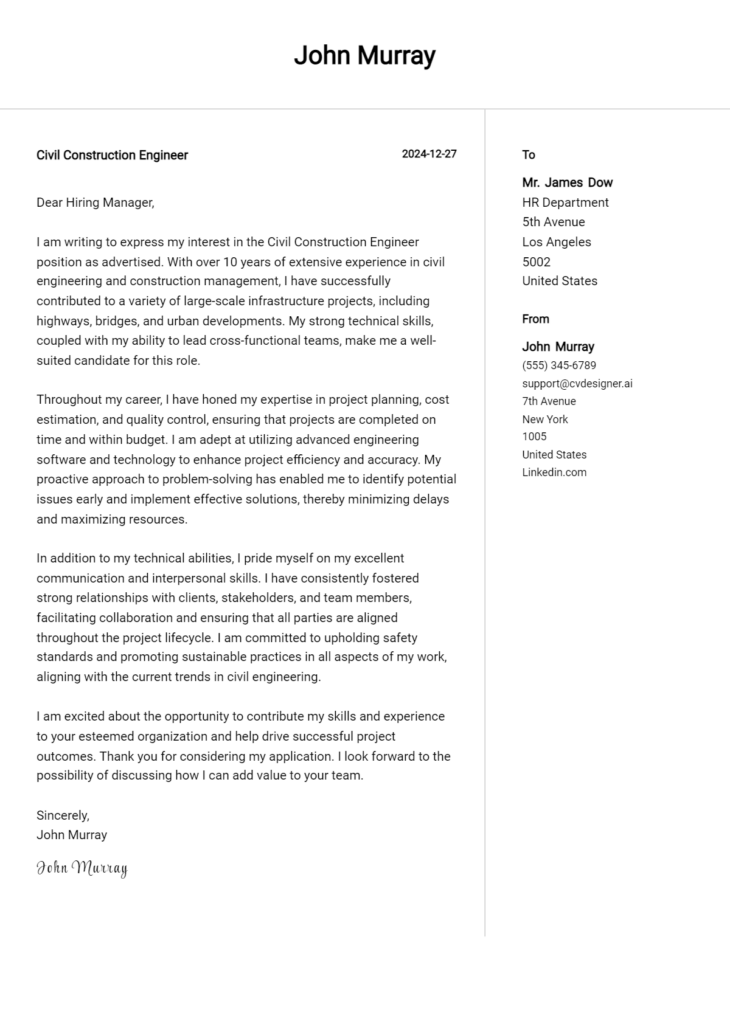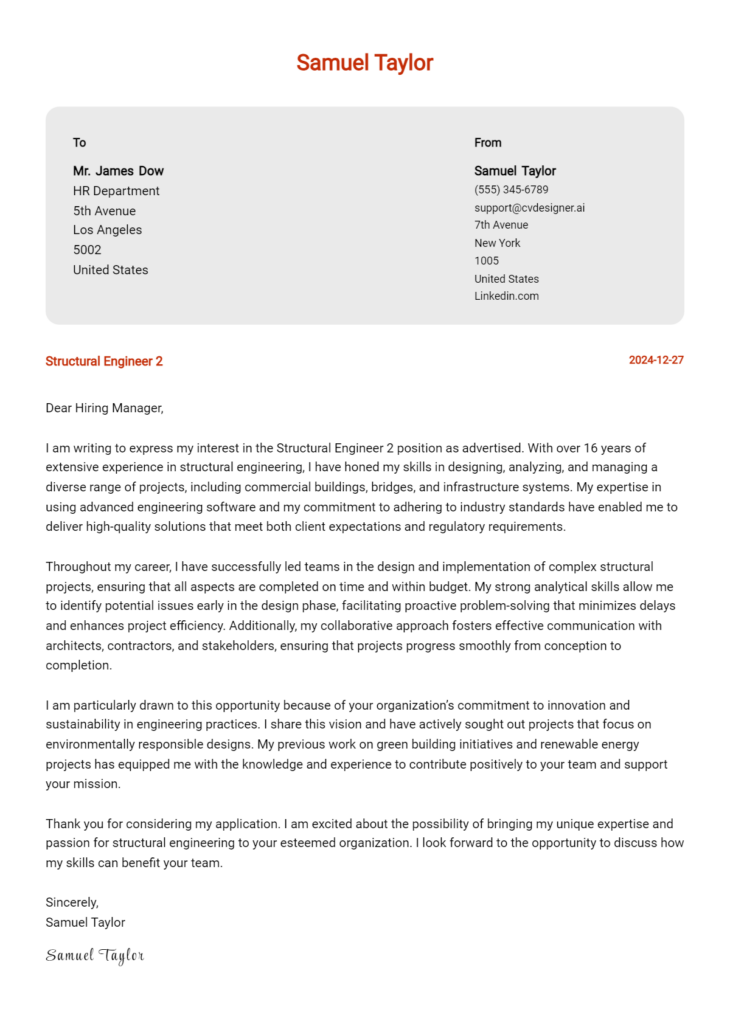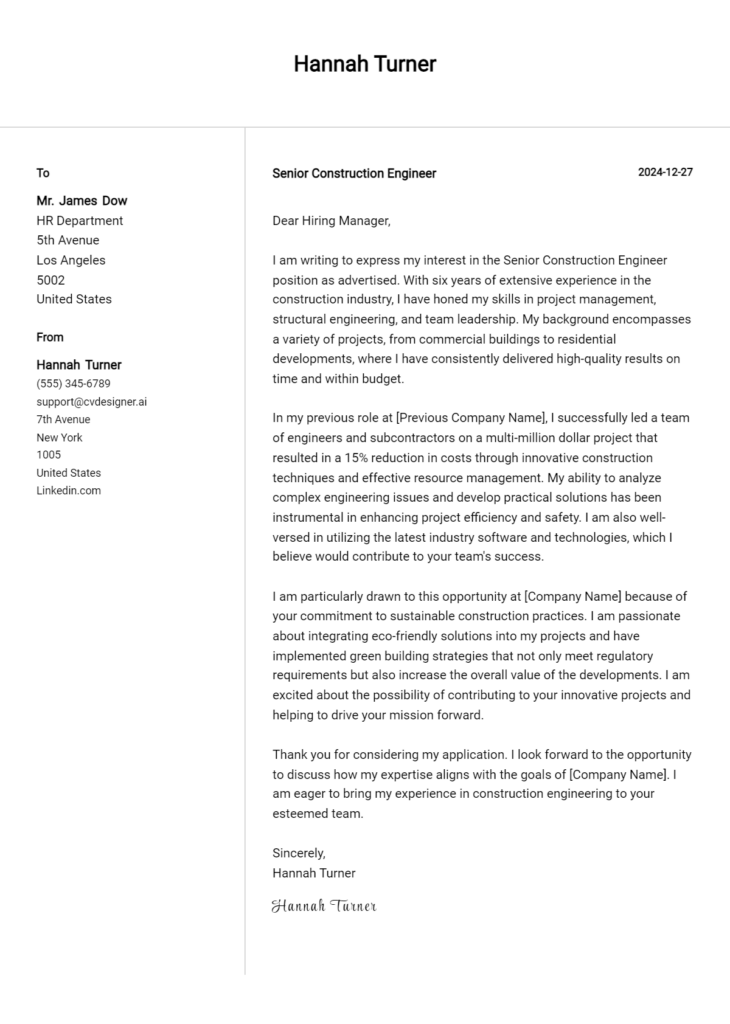Surveyor Cover Letter Examples
Explore additional Surveyor cover letter samples and guides and see what works for your level of experience or role.
How to Format a Surveyor Cover Letter?
Crafting an effective cover letter is essential for a Surveyor, as it serves as your first impression to potential employers. The way you format your cover letter not only reflects your professionalism but also demonstrates your attention to detail—a critical skill in surveying. A well-structured cover letter can capture the hiring manager's interest and convey your ability to communicate complex information clearly and succinctly.
In this guide, we’ll outline the key components of a professional cover letter tailored for Surveyors, providing insights and examples to help you create a standout document.
We will focus on the essential sections of your cover letter, including:
- Cover Letter Header
- Cover Letter Greeting
- Cover Letter Introduction
- Cover Letter Body
- Cover Letter Closing
Each section is crucial in showcasing your qualifications and expertise. Let’s dive into the details of how to format your surveyor cover letter effectively.
Importance of the Cover Letter Header for a Surveyor
The cover letter header is a crucial element of any professional correspondence, especially for a Surveyor. It serves as the first impression and sets the tone for your application. A well-structured header should include your contact information, the date, and the recipient's details, ensuring clarity and professionalism. This organization reflects your attention to detail—an essential quality for a Surveyor. A strong header not only reinforces your qualifications but also makes it easier for the employer to reach out to you.
Strong Example
John Smith 123 Main Street Cityville, ST 12345 john.smith@email.com (123) 456-7890 October 1, 2023 Hiring Manager XYZ Surveying Services 456 Elm Street Townsville, ST 67890
Weak Example
john smith email: johnsmith@email.com 10/1/2023 XYZ Surveying
The Importance of a Thoughtful Cover Letter Greeting
The greeting of your cover letter serves as a critical first impression, setting the tone for the rest of your communication. A well-crafted greeting not only demonstrates professionalism but also showcases your attention to detail and genuine interest in the position. By addressing the hiring manager directly, you personalize your application, making it more impactful. To avoid generic greetings, which can come off as impersonal, take the time to research the recipient's name, if available. This small effort can significantly enhance your connection with the reader.
Strong Example
Dear Ms. Johnson,
Weak Example
To Whom It May Concern,
In summary, a thoughtful greeting can elevate your cover letter, signaling to potential employers that you are both professional and invested in the opportunity.
The Importance of a Strong Cover Letter Introduction for a Surveyor
A well-crafted cover letter introduction is crucial for a Surveyor, as it sets the tone for the entire application and serves as the first impression on the hiring manager. This introduction should not only capture their attention but also convey the candidate’s enthusiasm for the role, highlighting relevant skills and notable achievements that demonstrate their qualifications. A compelling start can differentiate a candidate from others, making it essential to strike the right balance between professionalism and personal touch.
Strong Example
Dear [Hiring Manager's Name], As a dedicated and detail-oriented Surveyor with over five years of experience in land surveying and a proven track record of delivering accurate results on complex projects, I am excited to apply for the Surveyor position at [Company Name]. My comprehensive understanding of modern surveying techniques and my commitment to precision enable me to contribute effectively to your team from day one.
Weak Example
Hello, I saw the job posting for a Surveyor and thought I would apply. I have some experience in surveying, and I think I could do the job. I hope you consider my application.
Purpose of the Cover Letter Body for a Surveyor
The body of a cover letter for a Surveyor is crucial as it provides an opportunity to detail the candidate's relevant skills and experiences, thereby demonstrating their value to the prospective employer. This section should highlight specific projects or accomplishments that showcase the candidate's technical expertise, problem-solving abilities, and contributions to previous roles. By articulating these points, the candidate can effectively communicate their qualifications and how they align with the needs of the company, ultimately reinforcing their suitability for the position.
Strong Example
I am excited to apply for the Surveyor position at XYZ Engineering, as I believe my extensive experience in land surveying and project management aligns perfectly with your team’s needs. In my previous role at ABC Surveyors, I successfully led a team on a large-scale urban development project that involved precise topographical surveys and geospatial analysis. This project not only resulted in a 15% decrease in material costs through effective resource management but also received the 2022 Excellence in Surveying Award from the State Association. My commitment to quality and accuracy, combined with my proficiency in AutoCAD and GIS software, positions me to contribute significantly to your ongoing projects at XYZ Engineering.
Weak Example
I want to apply for the Surveyor job. I have worked in surveying for a while and know how to use some tools. I think I can do a good job. I once worked on a project, but I can’t remember the details. I am a hard worker and can learn quickly, so I would be a good fit for your company.
Importance of the Cover Letter Closing for a Surveyor
The cover letter closing is a critical section for a Surveyor as it serves to summarize your qualifications, reiterate your enthusiasm for the role, and encourage the hiring manager to take the next steps—such as reviewing your resume or scheduling an interview. A strong closing can leave a lasting impression, reinforcing your suitability for the position and demonstrating your proactive attitude. Conversely, a weak closing can diminish the impact of your application, making it sound generic or unenthusiastic.
Strong Example
Thank you for considering my application for the Surveyor position at [Company Name]. With my extensive experience in land surveying, proficiency in modern surveying technology, and strong problem-solving skills, I am confident in my ability to contribute effectively to your team. I am genuinely excited about the opportunity to work with [Company Name] and would love the chance to discuss how my background and skills align with your needs. I look forward to the possibility of an interview to further explore how I can add value to your organization.
Weak Example
I hope you look at my resume. I want to work for your company. Please call me if you want to talk.
Crafting a compelling cover letter is essential for aspiring Surveyors to stand out in a competitive job market. A well-written cover letter not only introduces your qualifications but also highlights your technical skills, problem-solving abilities, knowledge of the Software Development Life Cycle (SDLC), teamwork, and a passion for continuous learning. Below are some tips to help you create an effective cover letter tailored to the Surveyor role.
Tips for Writing an Effective Surveyor Cover Letter
Highlight Technical Skills: Clearly outline your technical skills relevant to surveying, such as proficiency in GIS software, AutoCAD, and surveying instruments. Mention specific projects where you applied these skills, demonstrating your capability and experience in the field.
Showcase Problem-Solving Abilities: Employers value Surveyors who can tackle challenges head-on. Illustrate your problem-solving skills by sharing instances where you identified issues and implemented solutions that improved project outcomes. Use metrics or data to quantify your achievements whenever possible.
Demonstrate SDLC Knowledge: If you have experience with the Software Development Life Cycle, discuss how it relates to your work as a Surveyor. Explain how understanding SDLC principles can enhance project management and execution in surveying tasks, showcasing your comprehensive understanding of the industry.
Emphasize Teamwork: Surveying often requires collaboration with various stakeholders, including engineers, architects, and construction teams. Highlight your experience working in teams and how your collaborative efforts have led to successful project completions. Mention any leadership roles you have taken on within these teams.
Express Passion for Continuous Learning: The surveying field is constantly evolving with new technologies and methods. Convey your eagerness to learn and adapt by mentioning any relevant certifications, courses, or workshops you have completed. This shows employers that you are committed to personal and professional development.
By integrating these tips into your cover letter, you will effectively showcase your qualifications and enthusiasm for the Surveyor role. If you need additional guidance, consider using cover letter templates or a cover letter builder to create a polished and professional document.
Common Mistakes to Avoid in a Surveyor Cover Letter
Crafting a compelling cover letter is essential for a successful job application as a surveyor. Avoiding common mistakes can significantly enhance your chances of landing an interview. Here are some prevalent pitfalls and tips to steer clear of them:
Generic Opening: Starting with a vague introduction can make your application blend in. Personalize your opening by addressing the hiring manager by name and mentioning the specific position you're applying for.
Lack of Specific Examples: Failing to provide concrete examples of your experience can weaken your case. Use specific projects or achievements to showcase your skills as a surveyor.
Ignoring the Job Description: Not aligning your cover letter with the job description can lead to mismatched expectations. Carefully analyze the requirements and highlight relevant experiences that demonstrate your fit for the role.
Overly Formal Language: Using excessively formal or technical jargon can alienate the reader. Aim for a professional yet approachable tone that reflects your personality and expertise.
Neglecting Formatting: A cluttered or poorly formatted cover letter can detract from your message. Follow a clear cover letter format to ensure readability and professionalism.
Repetition of Resume Content: Simply repeating what’s on your resume can bore the reader. Instead, use your cover letter to elaborate on key points and provide additional context.
Ignoring Proofreading: Typos and grammatical errors can leave a negative impression. Always proofread your cover letter before submission to ensure it’s polished and professional.
By steering clear of these common mistakes, you can create a strong cover letter that effectively showcases your qualifications and enthusiasm for the surveying position. For inspiration, consider reviewing cover letter examples to see how effective letters are structured.
Cover Letter FAQs for Surveyor
What should I include in my surveyor cover letter?
In your surveyor cover letter, you should include your contact information, the date, and the employer's details at the top. Start with a professional greeting and a compelling opening statement that captures the reader's attention. Highlight your relevant qualifications, including your education, certifications, and specific surveying skills such as land surveying, GIS proficiency, or construction surveying. Mention any relevant experience, focusing on projects that demonstrate your expertise and problem-solving abilities. Finally, express enthusiasm for the role and the company, and include a strong closing statement that invites further discussion. Tailoring your cover letter to each job application is crucial for showcasing your interest and fit for the position.
How can I demonstrate my skills in a cover letter?
To effectively demonstrate your skills in a surveyor cover letter, use specific examples that showcase your technical abilities and accomplishments. Instead of simply listing skills, describe scenarios where you successfully applied them. For instance, you could mention how you utilized advanced surveying technology to improve project efficiency or how your attention to detail helped avoid costly errors during site assessments. Quantifying your achievements, such as mentioning how much time or money you saved on a project, can also make your skills more tangible. Additionally, aligning your skills with the job description can help reinforce your suitability for the role.
How do I address gaps in my employment history?
If you have gaps in your employment history, it's essential to address them honestly in your cover letter. Briefly explain the reason for the gaps, whether it was for personal reasons, further education, or transitioning between roles. Focus on how you used that time productively, perhaps by acquiring new skills or certifications relevant to surveying. For instance, if you took time off to complete a degree or gain additional certifications, mention these achievements. Emphasize your eagerness to return to the workforce and how your previous experiences have prepared you for the role you’re applying for, turning potential concerns into positive talking points.
Should I include references in my cover letter?
Typically, you should not include references directly in your cover letter. Instead, your cover letter should focus on showcasing your qualifications, skills, and enthusiasm for the role. However, you can mention that references are available upon request, which indicates your willingness to provide them if needed. If you have strong references who can vouch for your surveying expertise, you can prepare a separate reference sheet to provide during the interview process. This approach keeps your cover letter concise and allows you to focus on making a strong case for your candidacy while ensuring that references are readily accessible when requested.
Build your Cover Letter in minutes
Use an AI-powered cover letter builder and have your letter done in 5 minutes. Just select your template and our software will guide you through the process.

